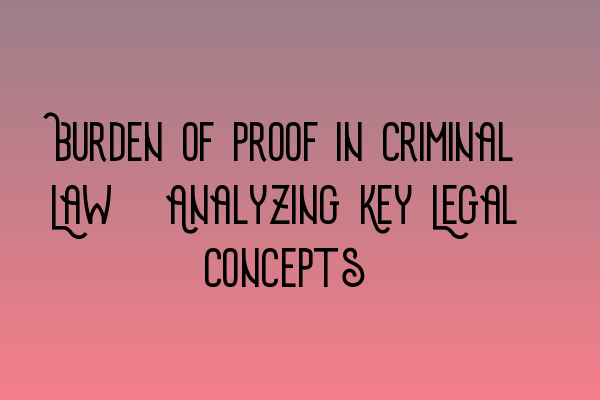Burden of Proof in Criminal Law: Analyzing Key Legal Concepts
Welcome to the SQE Criminal Law & Practice Blog, where we explore various aspects of criminal law to help aspiring solicitors enhance their legal knowledge and prepare for the SQE exams. In today’s article, we will dive deep into the concept of burden of proof in criminal law and examine its key legal concepts.
Understanding the Concept of Burden of Proof
In criminal law, the burden of proof refers to the responsibility of a prosecutor to prove the guilt of a defendant beyond a reasonable doubt. This means that the prosecution must present sufficient evidence to convince the judge or jury that the defendant is guilty of the charged offense.
The burden of proof lies with the prosecution throughout the trial. It is crucial to understand that the burden of proof does not shift to the defendant at any point. The defendant is presumed innocent until proven guilty.
Reasonable Doubt: A Crucial Element
One key concept related to the burden of proof is “beyond a reasonable doubt.” This standard of proof sets a high bar for the prosecution. It requires them to prove the defendant’s guilt to such an extent that there is no reasonable doubt in the minds of the judge or jury.
Reasonable doubt does not mean absolute certainty. It means that based on the evidence provided, a rational person would have no reasonable doubts about the defendant’s guilt. This standard ensures that innocent individuals are not wrongly convicted.
Presumption of Innocence
Another fundamental principle in criminal law is the presumption of innocence. The presumption of innocence means that every defendant is presumed innocent until proven guilty. This presumption serves as a safeguard against wrongful convictions.
As a solicitor, it is essential to approach every case with the presumption of innocence in mind. It is the duty of the prosecution to overcome this presumption by effectively presenting evidence that establishes guilt beyond a reasonable doubt.
The Role of Evidence
Evidence plays a crucial role in criminal proceedings. The prosecution must gather evidence that supports its case and convinces the judge or jury of the defendant’s guilt. The strength and relevance of the evidence presented can heavily influence the outcome of a criminal trial.
In criminal law, there are two types of evidence: direct evidence and circumstantial evidence. Direct evidence is firsthand proof, such as eyewitness testimonies or video recordings. Circumstantial evidence is indirect proof that requires inference, such as establishing motive or opportunity.
Challenging the Burden of Proof
As a defense solicitor, your role is to challenge the prosecution’s burden of proof. You may do so by questioning the credibility and reliability of the evidence presented, cross-examining witnesses, and presenting alternative explanations or theories.
It is crucial to build a strong defense strategy that aims to cast reasonable doubt on the prosecution’s case. By highlighting weaknesses and inconsistencies in the evidence, you can effectively challenge the burden of proof and protect the rights of your client.
Preparing for the SQE Exams
If you are preparing for the SQE exams, it is essential to have a solid understanding of the burden of proof in criminal law. Familiarize yourself with the key legal concepts, standards of proof, and the role of evidence in criminal proceedings.
To enhance your preparation, we recommend taking advantage of our SQE 1 Practice Exam Questions and SQE 1 Practice Mocks FLK1 FLK2. These resources will allow you to assess your knowledge, strengthen your skills, and familiarize yourself with the format of the exams.
Additionally, our SQE 1 Preparation Courses and SQE 2 Preparation Courses are designed to provide comprehensive guidance and support throughout your exam preparation journey. Our experienced instructors will help you develop a strong foundation in criminal law, ensuring you are well-equipped to tackle any question related to the burden of proof.
Stay Updated with SRA SQE Exam Dates
Stay informed about the upcoming SRA SQE exam dates by regularly visiting our website. Being aware of the exam schedule will help you plan your study, revision, and practice sessions effectively. Visit SRA SQE Exam Dates to access the latest information.
Thank you for reading our blog post on the burden of proof in criminal law. We hope you found this information valuable in your journey towards becoming a qualified solicitor. Stay tuned for more informative articles from SQE Criminal Law & Practice!
